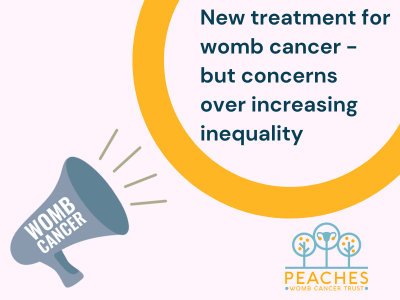A new treatment for patients with a specific type of primary advanced or recurrent womb cancer (also known as endometrial or uterine cancer) has been approved by NICE during Womb Cancer Awareness Month. This development means that some patients will get earlier access to a treatment that may help them live longer lives.
While welcoming the new treatment, Peaches are concerned that there is increasing inequality in access to innovative and effective treatment options on the NHS for around 80% of patients with womb cancer.
Currently, the majority of advanced cancer patients are treated with chemotherapy with or without surgery or radiotherapy but, while many womb cancers show an initial response, the cancer often returns. This means survival time for patients with advanced or recurrent womb cancer is often poor, with a survival rate of 15%.
The National Institute for Health and Care Excellence (NICE) has now recommended some patients receive a type of immunotherapy called durvalumab, with or without chemotherapy, as a combined first-line treatment for a specific type of advanced or recurrent womb cancer called mismatch repair deficient (dMMR).
Durvalumab works by stopping the cancer hiding from the body’s immune system. This helps the body’s immune system to kill the cancer cells and stop the cancer growing.
However, use of the combination of durvalumab with another medicine called olaparib has not been recommended for use on the NHS. This combination is specifically designed for and targeted those with a proficient mismatch repair (pMMR) subtype of womb cancer.
Grace Teeling, Advocacy and Policy Lead at Peaches Womb Cancer Trust, said:
“Peaches has welcomed the opportunity to contribute to appraisals of Durvalumab. We could not have done so without the contributions of Peaches Patient Voices, a group of people affected by womb cancer whose powerful testimonies and experiences informed our submissions.
While we welcome the approval of Durvalumab for some patients, we are concerned at the widening inequality created for a group of advanced cancer patients.
Additionally, we are worried that the lack of effective first-line treatments for the majority of people with advanced stage womb cancer is likely to disproportionately impact Black women who already have much poorer survival rates. Earlier access to more effective drugs at first-line stage for advanced patients could prevent deterioration to incurable or end of life stage disease.
Making this treatment available for people with all types of advanced or recurrent womb cancer would prevent widening inequalities in drugs access while helping address disparities and improve outcomes for everyone diagnosed with womb cancer.“


